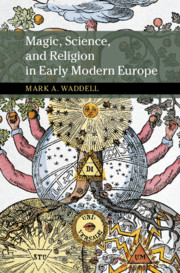Book contents
- Magic, Science, and Religion in Early Modern Europe
- New Approaches to the History of Science and Medicine
- Magic, Science, and Religion in Early Modern Europe
- Copyright page
- Dedication
- Contents
- Figures
- Acknowledgments
- Introduction
- 1 Hermeticism, the Cabala, and the Search for Ancient Wisdom
- 2 Witchcraft and Demonology
- 3 Magic, Medicine, and the Microcosm
- 4 A New Cosmos
- 5 Looking for God in the Cosmic Machine
- 6 Manipulating Nature
- 7 A New World?
- Conclusion
- Bibliographical Essays
- Index
7 - A New World?
The Dawn of the Enlightenment
Published online by Cambridge University Press: 22 January 2021
- Magic, Science, and Religion in Early Modern Europe
- New Approaches to the History of Science and Medicine
- Magic, Science, and Religion in Early Modern Europe
- Copyright page
- Dedication
- Contents
- Figures
- Acknowledgments
- Introduction
- 1 Hermeticism, the Cabala, and the Search for Ancient Wisdom
- 2 Witchcraft and Demonology
- 3 Magic, Medicine, and the Microcosm
- 4 A New Cosmos
- 5 Looking for God in the Cosmic Machine
- 6 Manipulating Nature
- 7 A New World?
- Conclusion
- Bibliographical Essays
- Index
Summary
The Enlightenment was the defining cultural and intellectual movement of the eighteenth century. Also known as the Age of Reason, it is generally viewed by historians as the emergence of the modern West. Enlightenment thinkers championed rationality and upheld Newtonian science, with its emphasis on natural laws, as the preeminent description of the natural world. The rise of religious tolerance across Europe, challenges to the cultural authority of organized religion, and the emergence of rational forms of religion such as deism all combined to produce a more secular mindset among the educated classes. Those same individuals also dismissed magic as a delusion of the ignorant and superstitious, but more recent scholarship has challenged the narrative of “disenchantment” in which magical beliefs and practices supposedly disappeared as rationality increased. In fact, occult philosophies and traditions from hermeticism to alchemy had already put their indelible stamp on the development of “scientific” disciplines long before the Enlightenment began. By 1750, the complex relationships between science, religion, and magic had assumed a configuration familiar to many people today.
- Type
- Chapter
- Information
- Magic, Science, and Religion in Early Modern Europe , pp. 189 - 202Publisher: Cambridge University PressPrint publication year: 2021

